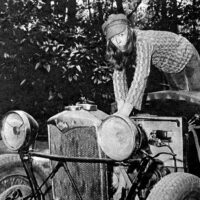 Written by: David Bowie
Written by: David Bowie
Recorded: 23 April 1971
Producer: David Bowie
Engineer: Ken Scott
Personnel
Mickey King: vocals
David Bowie: vocals, saxophone
Mark Pritchett: guitar
Herbie Flowers: bass guitar
Barry Morgan: drums
Recorded by the short-lived project Mickey King’s All Stars, ‘Rupert The Riley’ was written by David Bowie about his car, a 1932 Riley Gamecock.
It’s funny how I suddenly seem to have taken off as a songwriter. But that is what living down here has done for me. I’m wrapped up in my friends and include them in my songs. One of my songs, ‘Rupert The Riley’, is about the car.
Disc and Music Echo, 20 March 1971
Bowie owned two 1932 Riley cars, in black and red, and combined the parts to create a functional model. He was assisted in the build by his neighbour and roadie Roger Fry.
He had an original way of forcing himself into action. When it became apparent that songs for an album needed writing posthaste, he would look around the scenery until his consciousness settled on a likely target, then make his decision and announce the result to me.“Ah, you know, dear, I think I’ll rebuild the Riley. I could take the engine out and then work on it in the living room, couldn’t I?”
I’d react in the way you’d expect – tactfully of course – but David, not to be deterred from his primary purpose, would simply come up with another project. So instead of filling the living room with the million or so tiny, oily components of the average 1960s English engine compartment (a Riley’s engineering being no less complex, unreliable, and incomprehensible a squirrel cage than that of a classic MG or Jaguar), he’d decide to redecorate it. Which would result, naturally, in chaos: mess and disorder beginning in whatever corner he started to work in, then spreading to the rest of the room, then out into the hallway, and so on until in one way or another the entire household was disrupted.
At a certain point, which I grew able to predict quite accurately, the mess would achieve a critical mass within David’s consciousness, and he’d freak.
“God, I’ve got an album to do!” he’d say. “Honey, I’ve got to go!” And off he’d run.
Backstage Passes
In March 1971 Bowie was driving from his home to central London when the car stalled on Lewisham High Street. He mistakenly left it in gear while cranking the engine, and the car jolted forward, propelling the starting handle into his thigh, narrowly missing an artery, and pinning him to the car in front.
Bowie spent several days recuperating in Lewisham hospital, where he was interviewed by Lewisham Hospital Radio presenter Chris Warbis.
I’ve driven for about 30 years. When my father died in the ’60s I briefly inherited his Fiat 400 but drove the thing into the ground, up and down the M1, top-loaded with a Selmer PA system tied on with string. Then I got myself the bits of a Riley Gamecock and put it together. I managed to run myself over with this new toy outside Lewisham police station, planting the crank firmly in my thigh and cracking both my shins. How those Bobbies laughed. Main artery in thigh. Claret spurt spurt, laughing stops, faces drain, tourniquet produced. Hospital. Last but not least, I now have a 1967 Jaguar 1.5 E-type. Yes, it is British racing green.
Q magazine, July 2000
‘Rupert The Riley’ was left unreleased, although Bowie recycled the ‘beep beep’ motif in his 1980 hit ‘Fashion’.
In 1989 Rykodisc remastered the song for inclusion in the Sound + Vision box set, but again it was left in the vaults.
In the studio
‘Rupert The Riley’ was recorded at London’s Trident Studios on 23 April 1971. It contained a sample of roadie Roger Fry starting the car, recorded by Bowie outside his home Haddon Hall.
Lead vocals were by Mickey King, a male escort whom Bowie had met at London nightclub the Sombrero. Also known as Sparky and Nicky King, he was murdered in the mid-Seventies by a client.
He came into Trident one day to produce a single for a friend and because I’d worked with him before, I was put on the session. Around that time, I was getting fed up with just engineering, and in a tea break I happened to say to him, ‘You know what? I’m a bit frustrated. I want to start moving into the production side.’ He said, ‘Well, I’ve just got a new manager, and I’m about to start a new album. I was going to do it myself but I don’t know if I can, how about working with me?’
EQ, 2005
Also recorded during the session was ‘The Man’ (also known as ‘Lightning Frightening’), with Bowie singing. Another song recorded around this time, with the same musicians and King on vocals, was the Bowie composition ‘How Lucky You Are’ (originally titled ‘Miss Peculiar’).
